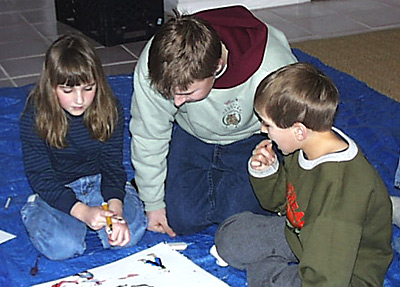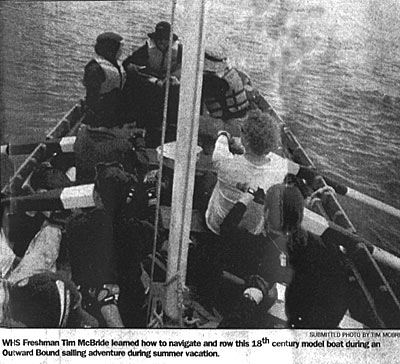
Tim was obviously a talented reader: he'd been able to cope with Michael Crichton novels from second grade. But by eighth grade, aged 14, his written work was causing problems: he'd answer a question in social studies with two unrelated sentences. During the summer of 2001, I started working with Tim to build compensation strategies for his highly individual learning styles. At school, he was introverted, had problems with auditory processing, and was 'slipping through the cracks': his guidance counselor failed to implement the 504 plan that had been assigned to him, and he appeared to be cast as lazy and irresponsible, needing simply to 'try harder' in order to improve.
He had been assessed for ADD, but I suspected something else, and further tests proved negative. Based on this, I used alternative, activity-based methods to encourage Tim to channel his abilities towards self-expression. By the next school year, Tim had flourished in his classes: for instance, writing about poetry in a confident and expansive manner. He continues to use the special-ed resource room for the areas in which he has most difficulty, but now that he has a more structured learning plan, based around specific goals, he shows much greater confidence in doing so.
Here is an extract from an email sent by Tim's father after our first meeting, which he's happy to share for the benefit of other parents:
1. Tim really enjoyed the rock climbing activity very much. This was a great way to break the ice with you.
2. Tim seemed to have liked talking to you. He was in a wonderful mood when we returned home, much more animated than he has been for a long time.
3. Your understanding and empathy of Tim's issues seemed remarkable, particularly in view of the short time you spent with Tim.
4. We were very impressed with your ability to communciate with Tim. This is probably enhanced by the fact that you know firsthand what Tim is experiecing. Because of your success, you seem to have enpowered Tim to think more positvely about himself. Finally, your whole style is positive. One of your first things you said to Tim indicated that you thought he could attend an Ivy League college...
5. We have tried to tell Tim that he is not the "bad guy" with respect to school. Some of your comments (particulary about teachers/educators) made that point much more clearly than we have been able to.
6. Finally, we have been trying to find someone who could coach Tim and provide with compensation approaches and techniques that would allow him to maximize his school success. You are the first person that we have found who actually seems to be able to do this.
By the time Tim returned to regular classes, he had grown sufficiently confident in his abilities and learning strategies to write fluently about poetry: "
In my opinion, poetry is basically complex emotions written down in figurative language. For added effect, rhyme and rhythm is added to communicate the idea in a more appealing way.
Poetry differs from prose because prose is written without rhyme and rhythm, so it sounds more realistic, because it sounds closer to everyday speech... The job of the reader is to first, read the poem and find the literal meaning. Then after that they will probably have to read it a few times over to find the figurative meaning. The figurative meaning that the reader finds may not always be the same as other reader's interpretations. In fact, no one may be able to get the real figurative meaning because the poem is based on the poet's deep personal experience.
All in all, poetry is a great thing full of literal and figurative language. In my opinion, a poem with a figurative meaning is like one giant metaphor.
This quality of expression, in essence channelling Tim's verbal fluency into his own writing, can also be seen in his responses to individual poems:
'The poem "O Captain! My Captain!" by Walt Whitman is a tribute to a captain of a ship who has died. The trip the captain and the crew have made has been successful, and the ship has weathered difficult and trying times at sea. As they come into the port, the narrator of the poem is telling his captain who has died that there is a celebration and a tribute to you for a success. Unfortunately, the captain cannot hear what the narrator is telling him. The voyage is successful and the crowds onshore are celebrating and cheering, but they do not know the captain has died. The narrator will have to give the news of the captain's death.
The theme of the poem is a tribute to a hero, and a leader. The captain of the ship has led his men to a successful voyage, but he did not survive. The narrator of the poem is paying a tribute to his hero and that the captain fought a hard and difficult battle, and won, but lost his life because of it. As the ship enters the port the people onshore are cheering the captain of his bravery and his success and the narrator is describing the scene to his dead captain. The narrator is showing respect, sadness, and regret that his hero isn't alive to enjoy the pride of the people. The central message is that the captain was brave, was a strong leader in a risky situation and his wise leadership and bravery saved the lives of his men at the cost of his own life.
The primary literary device is an analogy. Mr. Walt Whitman wrote this poem upon receiving the news of the assassination of President Abraham Lincoln. In his poem, the captain is President Lincoln, and he is the leader and the hero of the country. The ship was the United States of America. The mission of President Lincoln was to unite a divided country. The bloody Civil War was a consequence of this division of the country. President Lincoln was the "captain," who led our nation out of war and out of slavery.
This poem is a narrative poem that uses metaphors as an implied comparison of President Lincoln's assassination to that of a captain of a ship that has successfully completed it's mission but that the captain has lost his life in the battle...

Finally, here's another extract from an email by Tim's mother, discussing his progress:
Tim is doing very well. We have already had a meeting (they called the first day of school to arrange) with the team chair, speech and lang person and Tim's eng. teacher and his learning center teacher. Very positive people. Teachers are reporting very positive things. They all said he is very quiet in class and although he doesn't often participate voluntarily, they know he has the answers and are calling on him. They reported that he is becoming more comfortable in class and the hope is he will become more of an active participant. Tim said he always has the right answer when he gets called on. He has an 88% average in Latin. English teacher likes the way he writes. He had to write a paper comparing the fisherman in "The Old Man and the Sea" to something they have experienced and his comparison was the fisherman's fishing style to John's and my parenting style. He got an A- on the paper. The most important thing that is happening is that Tim is buying into the Learning Center. He really likes and is very positive about the woman who runs the learning center. He is asking for help and is receiving important support for those basic skills that he is weak in. It was the first meeting that I sat through where they described Tim and his learning style to me instead of the other way around.... We are cautiously optimistic and are watching as Tim grows, gains confidence and is experiencing academic success. He told us his teachers have respect for their students.
Previous story:
Nate - Teaching parents to reinforce learning skills
Next story:
Working through art - Building confidence with creative exercises
Back to 'For Parents' index
